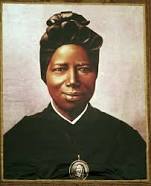HOMILY WEEK 05 02 – Year II
Worship from the Heart:
Optional Memorial of St. Josephine Bakhita
(1 Kg 8:22-30; Ps 84; Mk 7:1-13)
********************************************************
Did you notice that the word “heart” is mentioned in all three readings today? “Your servants who walk before you with all their heart” in the first reading; “My heart and my flesh sing for joy to the living God” in the psalm, and twice in the gospel, “..it enters, not the heart but the stomach” and “It is from within, from the human heart, that evil intentions come.”
The readings, and this memorial, invite us to worship God from the heart, genuinely and sincerely.
Today’s first reading relates the dedication of the temple and King Solomon’s prayer on that occasion, in which he praises God and asks God to dwell in the temple and remain with the people “who walk before God with all their heart.”
That phrase, and Solomon’s prayer, take on an ironic tone as we know that in actuality, the people were never faithful to the covenant, always wanted land, prestige and power, and Solomon’s own behavior was anything but faithful. One could say that Solomon and the people were not sincere in keeping the law of love, and started to depend only on external sacrifice rather than inner commitment and loving action.
From the time of Solomon to Jesus’ day – the temple worship had degraded into an externalist, sacrificial-based superficial-faith religion. As the reading yesterday put it, “sacrificing so many sheep and oxen they could not be numbered.” The temple and priesthood literally became a matter of butchery, and not really worshipping from the heart.
Turning to the gospel, the Pharisees, whose goal was to keep the law perfectly, criticized Jesus and his disciples for not following the Jewish traditions slavishly. Jesus points out their hypocrisy, especially regarding how they twist the scriptures to avoid caring for their own parents. His message is clear – God dwells not in buildings but in the human heart, and we must worship God not with bloody sacrifices, many rituals and prayers, but from the heart and with genuine caring and compassion.
External religion or religion from the heart – that is our decision. It is far easier to find God in temple and tabernacle, then in the messiness of everyday life and imperfect people, yet that truly is where the primary presence of Jesus is to be recognized. If we can’t see Jesus in others, we may not be really seeing him in the tabernacle or chapel either, no matter how many pious hours we spend there.
Abe was struggling with a member of his group, who was treating him with disdain. When he attempted to find out if he had done anything to provoke that treatment, the other person replied that everything was fine – he just went to the chapel and prayed to Jesus. Abe expressed in frustration he knew that Jesus was in the chapel and the tabernacle, but he needed that person to communicate with Jesus in him, to help resolve this painful situation.
Worshipping from the heart means that we are “single-minded” and make Jesus the centre and main priority of our lives. An insight that came to me recently was anytime we say “no” to the temptation of an over-attachment to possessions and pleasure, fame and prestige, power and control, we say “yes” to experiencing joy and to a closer relationship with Jesus who dwells within us.

St Josephine Bakhita
The saint the church honors today, Josephine Bakhita, is someone who certainly worshiped God from the heart. Slave traders kidnapped Josephine when she was only nine and gave her the name Bakhita which means ‘fortunate.’ While it may seem a cruel choice, in time Josephine came to see beauty in it, stating, “If I were to meet the slave-traders who kidnapped me and even those who tortured me, I would kneel and kiss their hands, for if that did not happen, I would not be a Christian and a religious today.”
Josephine was born in 1869 in the Darfur region of western Sudan. She was sold as a slave several times until 1883, when she was sold to the Italian consul who treated her with kindness and warmth. When he returned to Italy with his family, she accompanied them, and in 1888 she went to live at the Catechumenate of the Canossian Sisters in Venice. She was baptized in 1890, taking the name Josephine.
According to Italian law, since she had reached the age of majority, she was now free. She chose to join the Canossian Daughters of Charity and lived fifty years of religious life in Schio (Vicenza). She led a simple life as a cook, seamstress and doorkeeper, and her gentleness and compassion for the poor and suffering endeared her to all. She is still known today in Schio as ‘our Black Mother.’ She died in 1947, after a long illness, and was canonized in 2000. The first saint from Sudan, Josephine Bakhita is the patron saint of that country.
The Eucharist is truly worship from the heart. Pray that it may empower us to live out our faith as did St. Josephine Bakhita.



